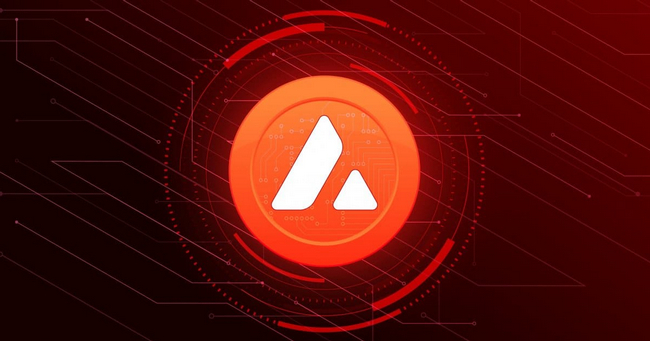-
 Bitcoin
Bitcoin $84,384.8183
-1.07% -
 Ethereum
Ethereum $1,575.4217
-2.16% -
 Tether USDt
Tether USDt $1.0000
0.01% -
 XRP
XRP $2.0513
-1.44% -
 BNB
BNB $587.7666
-0.46% -
 Solana
Solana $136.1987
-1.90% -
 USDC
USDC $0.9999
-0.01% -
 TRON
TRON $0.2449
1.47% -
 Dogecoin
Dogecoin $0.1531
-3.16% -
 Cardano
Cardano $0.6115
-1.84% -
 Chainlink
Chainlink $13.1143
2.54% -
 UNUS SED LEO
UNUS SED LEO $9.3289
0.19% -
 Avalanche
Avalanche $19.3767
-1.94% -
 Toncoin
Toncoin $2.9937
0.90% -
 Stellar
Stellar $0.2413
-1.97% -
 Shiba Inu
Shiba Inu $0.0...01238
1.50% -
 Hedera
Hedera $0.1638
-1.14% -
 Sui
Sui $2.0935
-2.40% -
 Bitcoin Cash
Bitcoin Cash $332.2596
-0.98% -
 Polkadot
Polkadot $3.8775
3.68% -
 Hyperliquid
Hyperliquid $17.3658
-3.92% -
 Litecoin
Litecoin $76.0310
0.32% -
 Dai
Dai $1.0000
0.00% -
 Bitget Token
Bitget Token $4.3896
-3.25% -
 Ethena USDe
Ethena USDe $0.9993
0.01% -
 Pi
Pi $0.6275
-2.84% -
 Monero
Monero $216.5762
1.82% -
 Uniswap
Uniswap $5.2230
-0.81% -
 Pepe
Pepe $0.0...07465
1.17% -
 Aptos
Aptos $4.9923
2.61%
Popular science: What kind of currency is AVAX coin? How to get AVAX coins?
AVAX serves multiple roles within the Avalanche network, including transaction fee payment, network security through staking, and governance through decentralized autonomous organizations (DAOs).
Oct 03, 2024 at 09:59 pm

What is AVAX Coin?
AVAX is the native token of the Avalanche blockchain platform, which is a decentralized, open-source blockchain network that enables the creation and execution of smart contracts and decentralized applications (dApps). AVAX serves various functions within the Avalanche ecosystem:
- Transaction Fees: AVAX is used to pay for transaction fees on the Avalanche network. These fees are necessary to incentivize network participants to validate and process transactions.
- Network Security: AVAX holders can stake their tokens to validate transactions on the Avalanche blockchain. In return, they receive rewards in the form of additional AVAX tokens. This staking process contributes to the security and decentralization of the network.
- Governance: AVAX holders have the right to participate in the governance of the Avalanche network through decentralized autonomous organizations (DAOs). They can cast votes on proposals that affect the development and direction of the platform.
How to Get AVAX Coins
There are several ways to obtain AVAX coins:
- Cryptocurrency Exchanges: You can purchase AVAX coins on major cryptocurrency exchanges such as Binance, Coinbase, and Kraken. These exchanges allow you to trade AVAX against other cryptocurrencies or fiat currencies like US dollars.
- Staking: As mentioned earlier, you can stake your AVAX coins to participate in the security of the Avalanche network. In addition to earning rewards, staking can also provide you with a passive income stream.
- AirDrop: Avalanche occasionally conducts airdrops, which are free distributions of AVAX tokens to promote the platform and reward early adopters.
- DeFi Platforms: You can earn AVAX tokens through liquidity pools, yield farming, and other DeFi activities on platforms such as Aave, Curve, and SushiSwap.
- Nodes: If you operate a validator node on the Avalanche blockchain, you will earn AVAX rewards for processing transactions and contributing to the network's security.
Additional Information
- Ticker Symbol: AVAX
- Blockchain: Avalanche
- Max Supply: 720 million AVAX
- Circulating Supply: Approximately 290 million AVAX (as of January 2023)
- Token Standard: ERC-20 (Ethereum-based) and AVAX Native (Avalanche-based)
Disclaimer:info@kdj.com
The information provided is not trading advice. kdj.com does not assume any responsibility for any investments made based on the information provided in this article. Cryptocurrencies are highly volatile and it is highly recommended that you invest with caution after thorough research!
If you believe that the content used on this website infringes your copyright, please contact us immediately (info@kdj.com) and we will delete it promptly.
- Pi Network (PI) Price Prediction: It Could Get Ugly
- 2025-04-21 00:25:13
- Dogecoin (DOGE) Holders Celebrate Doge Day on April 20, 2025, as the Community Awaits a Possible DOGE ETF
- 2025-04-21 00:25:13
- A renewed wave of optimism is spreading through the Dogecoin market
- 2025-04-21 00:20:13
- Solana (SOL) Price Wedged Between Two Crucial Levels, Breakout or Breakdown?
- 2025-04-21 00:20:13
- Bitcoin BTC/USD, Ethereum ETH/USD, XRP XRP/USD, and Dogecoin DOGE/USD Moved Sideways Amid Tariff Uncertainties
- 2025-04-21 00:15:12
- The Solana Price Was One of the Few Highlights
- 2025-04-21 00:15:12
Related knowledge

What is Ethereum’s Slashing mechanism and how to punish malicious behavior?
Feb 20,2025 at 03:08am
Key PointsOverview of slashingDifferent types of slashing in EthereumIncentives and consequences of slashingIdentifying and reporting slashed validatorsOngoing discussions and potential improvementsEthereum's Slashing Mechanism: Punishing Malicious BehaviorEthereum's slashing mechanism is an essential tool for ensuring network security and punishing mal...

What is the verifier node of Ethereum and how to become a verifier?
Feb 19,2025 at 06:00pm
The Verifier Node of Ethereum: A Comprehensive GuideKey Points:What is a Verifier Node?How to Become a Verifier NodeResponsibilities and Rewards of a Verifier NodeMinimum Requirements for Becoming a Verifier NodePotential Difficulties in Running a Verifier Node1. What is a Verifier Node?A Verifier Node is an independent entity on the Ethereum network th...

What is Ethereum’s staking, and how to participate and earn money?
Feb 19,2025 at 04:37pm
Key Points:Understanding Ethereum's Staking MechanismSteps to Participate in StakingBenefits and Rewards of StakingSecurity and Risk ConsiderationsTechnical Requirements and Hardware OptionsPotential Challenges and Troubleshooting TipsFAQs on Ethereum StakingWhat is Ethereum's Staking?Proof-of-Stake (PoS) is a consensus mechanism used in blockchain netw...

What is Ethereum’s DAO (Decentralized Autonomous Organization) and how does it work?
Feb 20,2025 at 03:12am
Key PointsDefinition and Structure of a DAOGovernance and Decision-Making in DAOsBenefits and Use Cases of DAOsChallenges and Limitations of DAOsWhat is Ethereum's DAO (Decentralized Autonomous Organization) and How Does It Work?Definition and Structure of a DAOA Decentralized Autonomous Organization (DAO) is an innovative governance and management fram...

What is Ethereum's multi-signature wallet and how to improve security?
Feb 20,2025 at 02:18pm
Key Points:Understanding the Concept of a Multi-Signature WalletBenefits and Drawbacks of Multisig WalletsRequirements for Setting Up a Multisig WalletStep-by-Step Guide to Generating a Multisig WalletImplementing Strategies for Enhanced Security1. Understanding the Concept of a Multi-Signature WalletA multi-signature (multisig) wallet in the Ethereum e...

What is Ethereum's oracle and how to provide data for smart contracts?
Feb 21,2025 at 01:30am
Key Points:Understanding the concept of oracles in EthereumExploring different types of oraclesDetailed guide on how to provide data for smart contractsAddressing potential challenges and considerationsWhat is Ethereum's Oracle?Oracles are crucial components in the Ethereum ecosystem, enabling smart contracts to access real-world data and off-chain even...

What is Ethereum’s Slashing mechanism and how to punish malicious behavior?
Feb 20,2025 at 03:08am
Key PointsOverview of slashingDifferent types of slashing in EthereumIncentives and consequences of slashingIdentifying and reporting slashed validatorsOngoing discussions and potential improvementsEthereum's Slashing Mechanism: Punishing Malicious BehaviorEthereum's slashing mechanism is an essential tool for ensuring network security and punishing mal...

What is the verifier node of Ethereum and how to become a verifier?
Feb 19,2025 at 06:00pm
The Verifier Node of Ethereum: A Comprehensive GuideKey Points:What is a Verifier Node?How to Become a Verifier NodeResponsibilities and Rewards of a Verifier NodeMinimum Requirements for Becoming a Verifier NodePotential Difficulties in Running a Verifier Node1. What is a Verifier Node?A Verifier Node is an independent entity on the Ethereum network th...

What is Ethereum’s staking, and how to participate and earn money?
Feb 19,2025 at 04:37pm
Key Points:Understanding Ethereum's Staking MechanismSteps to Participate in StakingBenefits and Rewards of StakingSecurity and Risk ConsiderationsTechnical Requirements and Hardware OptionsPotential Challenges and Troubleshooting TipsFAQs on Ethereum StakingWhat is Ethereum's Staking?Proof-of-Stake (PoS) is a consensus mechanism used in blockchain netw...

What is Ethereum’s DAO (Decentralized Autonomous Organization) and how does it work?
Feb 20,2025 at 03:12am
Key PointsDefinition and Structure of a DAOGovernance and Decision-Making in DAOsBenefits and Use Cases of DAOsChallenges and Limitations of DAOsWhat is Ethereum's DAO (Decentralized Autonomous Organization) and How Does It Work?Definition and Structure of a DAOA Decentralized Autonomous Organization (DAO) is an innovative governance and management fram...

What is Ethereum's multi-signature wallet and how to improve security?
Feb 20,2025 at 02:18pm
Key Points:Understanding the Concept of a Multi-Signature WalletBenefits and Drawbacks of Multisig WalletsRequirements for Setting Up a Multisig WalletStep-by-Step Guide to Generating a Multisig WalletImplementing Strategies for Enhanced Security1. Understanding the Concept of a Multi-Signature WalletA multi-signature (multisig) wallet in the Ethereum e...

What is Ethereum's oracle and how to provide data for smart contracts?
Feb 21,2025 at 01:30am
Key Points:Understanding the concept of oracles in EthereumExploring different types of oraclesDetailed guide on how to provide data for smart contractsAddressing potential challenges and considerationsWhat is Ethereum's Oracle?Oracles are crucial components in the Ethereum ecosystem, enabling smart contracts to access real-world data and off-chain even...
See all articles























































































